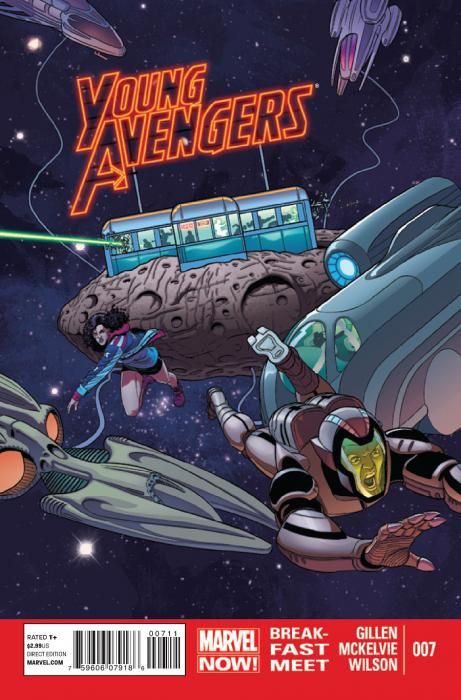"Young Avengers" #7 by Kieron Gillen and Jamie McKelvie is a great jumping-on point, and every curious reader who isn't already on board should get on the wagon now. It's a smooth read, but it's also formally challenging. It's creative and mainstream, slick and daring, and it plays both to and against reader expectations.
The first seven pages are a case in point. "Yamblr" continues to be an effective recap method for the first page. Gillen then begins the story from the first-person point of view of one of the Skrulls that have been harassing our heroes, an unusual choice. The Skrulls' narration is amusingly hyperactive and tongue-in-cheek, and McKelvie's rendering of their excited dorky faces also endears the Skrulls briefly to the reader. Just as quickly, Gillen throws a sudden twist in, wrapping up the caper in a hilarious, out-of-left-field way.
This compact joke is followed by two even more elegant creations from Gillen and McKelvie: (1) diner menu-themed credits pages (built into the story in an organic and amusing way) and (2) a remarkably concise and clever compression of three months of action into Kid Loki's Instagram-like feed or album, complete with comments. Each of the nine panels on the page of Loki's "photos" is a miniature landscape, and McKelvie's visuals that tell their own story instead of merely illustrating Gillen's words.
McKelvie's panel compositions continue to be innovative and effective, especially in the two-page spread inside Prodigy's head, and also a page near the end of the issue, in which shattered glass and a change in shading signal an ominous shift in space, time and reality. McKelvie's facial expressions are a superb assist to Gillen's dialogue, especially in a scene between Miss America Chavez and Kid Loki.
Character interaction in "Young Avengers" #7 hits a new high as the team begins going about as a unit, not just in battle but in their off-hours. Prodigy's introduction to the team is pitch-perfect in his Sherlock-like deductions, and McKelvie thoughtfully provides a round-table of amusing reaction shots from all concerned.
Gillen makes a crack about "reasonable plot progression" in the credits, but it's true as advertised. The clunkiest part of the first arc of "Young Avengers" was the Evil Parasite Mother villain. Mother is still the reason why the kids can't go home, and that bit of conceit still feels manufactured, but all that is tucked into the background now. Gillen's plotting gets stronger as he brings his characters together and neatly ties together old and new plot threads. The action moves forward quickly, but it also casually fits in moments like a talk between Hulking and Noh-varr about relationships, and a revelation about the still-mysterious Miss America Chavez.
"Young Avengers" #7 is not a resolutely high-brow title, happily so, but every page has evidence of Gillen and McKelvie's formal experimentation, little gifts to the reader for paying attention. These showy results are the consequence of subtle craftsmanship. Most impressively, the experimentation serves the story instead of just being academically interesting. All the clever verbal and visual risks Gillen and McKelvie take enhance both characterization and the reading experience instead of being distracting or overshadowing the action. At the same time, the playful, acrobatic artistry of "Young Avengers" is an attraction in its own right, making it one of the best examples on the shelves of style as substance.

